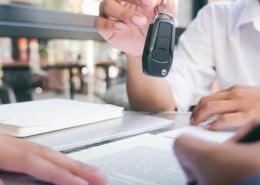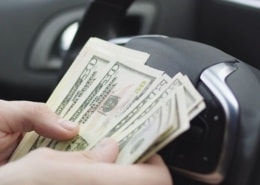How to Get the Most Money For Your Trade-in
Simple Tips to Increase Your Trade-in’s Value
When you trade your car in at a dealership, you become the seller, and the dealer becomes the buyer. You’re selling your vehicle to the dealer for the most money you can get.
Keep in mind that the dealer wants to buy your car for as little as possible. Your goal is to get the most money you can out of your current vehicle to lessen the amount you have to pay for the car you want. There are many simple, low-cost tips you can do that will dramatically increase the value of your trade.
Think Like a Used Car Appraiser
You are trying to get the most money possible when trading your car. You’re possibly trying to get thousands of dollars for it. Completing a few simple tips and tricks may help you get even more money for your trade.
Never trade a vehicle in at a car dealership until you have a reasonable estimate of its worth. Check out my step-by-step guide on how to trade in a car to guarantee you get the most money for it. Spending a few dollars and a sunny afternoon to increase your chances of getting more money is not a bad investment.
Should You Clean Your Trade Before Having It Appraised?
ABSOLUTELY!
Many say you should not clean your trade because the dealer will know you’re there to buy a car. This bad advice has been passed on for a long time, and in my experience, I say it’s not true. No matter how old your car is, there are several good reasons to clean up your car before having it appraised.
- First impressions are everything – Remember, you’re selling your car to the car dealership.
- If your car is clean, the appraiser will likely think you take care of your car and must do the preventive maintenance (oil changes, fluid checks, etc.).
- When putting a figure on your vehicle, a clean car could be the difference between a few hundred to a couple of thousand dollars.
- You want the dealer to know you’re ready to trade and make a deal, putting the ball in their court.
I’ve appraised thousands of cars during my career in the car business. There are certain things I always look for while valuing a vehicle. Looking at a nice clean car, no matter the age makes my job easier and a little looser with my pencil.
Think about the last ten cars that went through the dealership’s appraisal process that the used car manager had to put a value on right before yours. I promise you he’s had to drive and value some cars you wouldn’t be caught dead driving.
Your trade may be a sight for sore eyes; believe it or not, he may appreciate it by giving you a little bit more money than he would normally.
If a vehicle being appraised doesn’t need a lot of reconditioning to get it ready for sale. It will not be discounted as much when being valued by an appraiser.
Low-Cost Tips to Increase the Value of Your Trade-In
First impressions are everything. Many times a used car appraiser will begin deciding in their head how they are going to bid on a car as they approach it. I often would not get in a car just because it was filthy. I would automatically know I would not be giving “all the money for a car.”
You want to get your car in “retail sales condition.” Your trade vehicle needs to be as clean and perfect as possible. In reality, you are selling it to the dealership.
These low-cost tips can all be completed in an afternoon. I guarantee you they will impress a used car appraiser and get you more money than if you did not do them. Let’s get started.
1) Detail and Wax Your Vehicle
You wouldn’t believe how many filthy dirty vehicles I’ve appraised. When I have to inspect a vehicle like this, I tend to check the car more closely for problems because if your car looks this bad, you likely have not been doing the preventive maintenance either.
Before you have your trade-in appraised, get it detailed and waxed, make sure they shampoo the carpet, or get some exercise and do it yourself. Ensure you don’t forget the door, hood, and trunk jams. Also, polish the tires and clean all the glass inside and out.
You wouldn’t sell a car to a private party trashed out, would you? I guarantee it will be money well spent. Don’t go overboard with the cleaning products; you want your car to look clean all the time, and please, do not ever Armor All the steering wheel!
2) Inspect and Clean the Engine Compartment
Clean the engine compartment and ensure no tools, rags, or half-empty fluid bottles. Some detail companies will clean the engine compartment for you when detailing your car. If you do it yourself, make sure you use a good quality degreaser and get all the chemicals off your belts and hoses.
3) Empty and Clean Out All of Your Vehicle’s Compartments
Ensure you remove all the trash and junk from your console collected over time. Vacuum it out and do the same with your glove compartment.
You should leave any maintenance records, locking lug keys, owner’s manual, leather cleaner, and touch-up paint in the glove box. Doing so is a good sign for an appraiser.
Make sure you remove your name, address, and phone number from any records you leave. You wouldn’t want the next owner to contact you a year later.
Your trunk should be emptied and clean. Clean it out if you have a bunch of junk in your trunk. Do not leave a box of empty fluid bottles, air filters, or tools in the trunk of your car. This is a bad sign for an appraiser.
If you have a spare tire area under your trunk mat, make sure your spare is not flat, and there’s no standing water. You will want to clean and vacuum this area also.
4) Inspect or Change Your Windshield Wiper Blades
You don’t have to buy a $20 set of wiper blades; replace your current ones with a nice cheap set and ensure you get the correct size for the vehicle. When the appraiser turns them on to check the wiper fluid, they’ll clean the windshield off and operate nice and smooth.
Check the wiper fluid reservoir. If you don’t have wiper fluid put in water and a few drops of dishwashing soap or Windex to get you by.
5) Windshield Condition Starred or Cracked
An appraiser will immediately subtract for any defects in your windshield; you may as well get it fixed. Some states will not let you get a state inspection with a broken windshield, and some insurance companies will fix or replace a windshield for free. Do not let an appraiser take off for a star fixed on a windshield. Dealers usually repair windshield stars if they’re not within the driver’s direct view.
6) Restore Foggy or Blemished Headlights
Faded headlights make a vehicle look old and worn. If your headlight lenses are foggy and scratched, you can typically restore them without expensive replacement. There are several home remedies to fix faded headlights. A quick search on the Internet will bring up several solutions, such as using toothpaste to clean up your headlights to get you through the trade-in process.
7) Replace All Interior and Exterior Broken Light Bulbs
Quickly check your headlights, brake lights, running lights, and turn signals with a friend or family member. Don’t forget to check your interior lights. Replace if needed; bulbs are cheap and can be picked up online or at any local auto parts store.
8) Check, Fill, or Replace Your Vehicle’s Fluids
One of the little “tattle-tales” an appraiser uses is the little reminder sticker all the oil change companies put up in the left-hand corner of your windshield. A good appraiser will still physically check your car’s engine oil, transmission fluid, radiator, brake, and windshield wiper fluid.
I guarantee they will check your fluids if they find an expired sticker on your windshield.
Please ensure you get them all changed, topped off, and leave the little sticker on the windshield. This is also a good sign to an appraiser you keep up with the preventive maintenance on your car.
9) Get a Tune-Up and Replace the Air Filter
If your vehicle runs rough, you can get a cheap tune-up at a local quick-service place. They’ll try and up-sell you everything under the sun, but the basic tune-up is all you’re after. If you don’t want to pay for a basic tune-up, change your car’s air filter.
An appraiser will quickly pick up that your vehicle is running rough; instead of trying to figure out why he will automatically start deducting money from the overall value of your car.
10) Get Rid of That Smell
A foul smell in a car is a deal killer. Whatever you do, don’t use 10 of those little pine trees. Use ionizers and neutralizers to eliminate foul odors and run the a/c so it will circulate. You can contact detail companies and ask if they have an ionizer and offer the service.
You can try and do it yourself with Febreze or some other deodorizer; however, it may take longer, and you will have to leave your windows down for an extended period.
11) Touch Up any Minor Chips and Scratches
There are several compounds and chemicals out there to cover or mask chips and scratches long enough to trade in your car. You can also use touch-up paint, ensure you get the correct color code of your vehicle, and take your time filling in the scratches. You can go to your local auto parts store, and they’ll show you how to get your paint code and even sell you the paint.
12) Organize Your Maintenance Records
Fold up and organize any maintenance records nice and neat and put them in the glove compartment. Make sure you remove your name, address, phone number, and private payment information from them before trading in your car.
13) Make Sure Your Air Conditioner Blows Cold
If your air conditioner is not working or not blowing cold, you may have a problem. Spend the money and have a mechanic look at it. If it’s a slow leak, have the mechanic charge it so it will blow cold long enough for you to trade the car in.
Appraisers will subtract big money for a non-working a/c even if you tell them it’s a leak. As long as your a/c is blowing cold while your vehicle is appraised, it should not be an issue.
14) Align, Balance, and Rotate the Tires
Car dealers will use this trick on unsuspecting used car buyers. If a dealer has a car with some wear on one side of the tire, they’ll rotate the tires and put the worn part towards the inside of the wheel well so you can’t see it easily. Why not use the same trick?
If your car strays right or left, you may want to check the wear on the tires, or you may need to get a quick alignment. Most places will rotate your tires, balance them, and align your vehicle for cheap. Doing this will keep the appraiser from deducting additional money from your total amount.
Suppose your tires are beyond repair. Go pick up some cheap tires before trading your car. They don’t have to be brand new but make sure they have some tread on them. Appraisers will take a lot of money to replace the tires on your trade-in.
Take time to prepare your trade-in by following a few or all of the above tips. This will significantly increase your chances of getting the most money when trading your car with a dealership.
15) Have Your Vehicle’s Title With You
Make sure the car is titled in your name, and the vehicle identification number on the title matches the VIN on the car. Do not sign the tag until you’re signing the paperwork for your new car. NEVER store your vehicle’s title in the car. You should keep your vehicle’s title in a secure place such as a file cabinet or safe in your residence.
Further Tips and Advice
Further tips and advice about trading in a vehicle with a dealership:
- You will not make as much money if you trade your car at a dealership versus selling it yourself.
- Buying and trading a car should be looked at as two separate transactions.
- When you buy a car, you’re the “buyer.” When you trade a vehicle, you’re selling it to the dealer, so you become the “seller.”
- Do not mention that you will be trading a vehicle too early in the car buying process.
- Always agree to a purchase price on the vehicle you want to buy before you bring up you want to trade a car.
- Don’t leave your bank statements, purse, title, or private information in your car’s seat, glove compartment, or floorboard. You would be surprised at some of the stuff (private and illegal) I’ve seen left in vehicles I’ve appraised in the past.








